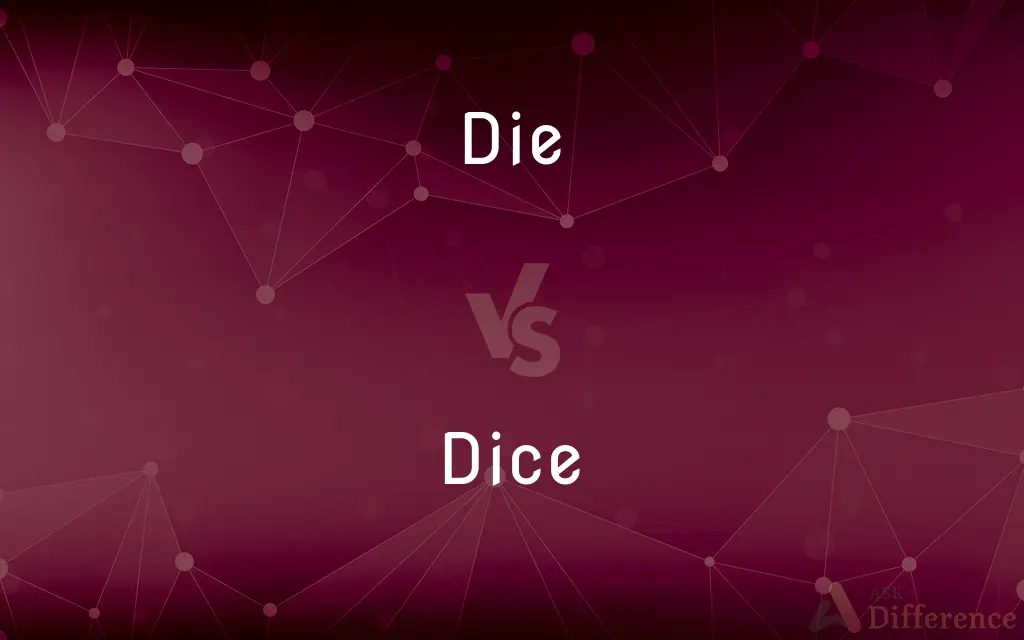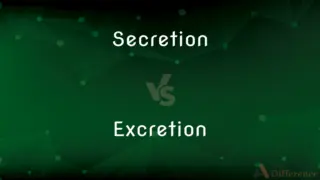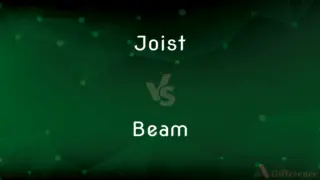Die vs. Dice — What's the Difference?
By Urooj Arif & Maham Liaqat — Updated on March 22, 2024
Die is a singular noun referring to a small cube with different numbers of spots on each side, used in games, while dice is the plural form, indicating two or more such cubes.

Difference Between Die and Dice
Table of Contents
ADVERTISEMENT
Key Differences
A die is a small cube marked on each of its six faces with a different number of spots, ranging from one to six, traditionally used in gambling and board games for generating random numbers. Dice, on the other hand, is the plural form of die, referring to two or more of these cubes when used together in games. The confusion between die and dice arises because "dice" is also commonly used as a singular noun in informal settings, though "die" is the correct singular term in standard English.
In gameplay, a single die may be used for games that require a player to generate a random number between one and six, guiding movements or decisions. Dice, when mentioned in plural, implies the use of multiple cubes, which can combine to produce a wider range of outcomes, useful in a variety of gaming scenarios, from board games to educational activities.
The terminology extends beyond gaming into metaphors and expressions. For example, "the die is cast" signifies a point of no return, emphasizing the singular "die" in a metaphorical context. Conversely, in casual conversation about games, one might hear "roll the dice" as an encouragement to take a risk or chance, reflecting the plural use.
The evolution of the term reflects the broader use of dice in society. While a single die was sufficient for many traditional games, the advent of complex board games and role-playing games increased the prevalence of scenarios requiring multiple dice, making the plural form more commonly heard in everyday language.
Manufacturing and design innovations have introduced dice with more than six faces, catering to specialized gaming needs. However, the fundamental distinction remains: a die is a single cube, while dice refer to the collection of two or more, whether they adhere to traditional designs or incorporate modern variations.
ADVERTISEMENT
Comparison Chart
Number
Singular
Plural
Usage
In games requiring a single random number generator
In games or scenarios requiring multiple random number generators
Common Misuse
Correctly used as singular
Often incorrectly used as singular in informal contexts
Expressions
"The die is cast."
"Roll the dice."
Design Variations
Traditionally six-sided
Can include multiple dice with various numbers of sides
Compare with Definitions
Die
A single six-sided cube used in gaming.
She rolled the die and got a six.
Dice
Variably designed for complex gaming.
The game uses several dice with different numbers of sides.
Die
Represents a singular object in board games.
Each player picks a die to roll for their turn.
Dice
Symbolic of taking chances or risks.
Life is about knowing when to roll the dice.
Die
Singular form referring to one gaming cube.
The die landed on the edge before settling.
Dice
Plural form, referring to two or more gaming cubes.
He shook the dice in his hand before rolling.
Die
Used metaphorically to indicate fate or chance.
With that decision, the die was cast.
Dice
Often misused singularly in casual speech.
Can you hand me the dice?
Die
Basis for numerous games and decisions.
The outcome depends on how the die rolls.
Dice
Used in games requiring a range of numbers.
We need two dice to play this board game.
Die
Be very eager for something
They must be dying for a drink
He's dying to meet you
Dice
Dice (singular die or dice) are small, throwable objects with marked sides that can rest in multiple positions. They are used for generating random numbers, commonly as part of tabletop games, including dice games, board games, role-playing games, and games of chance.
Die
Have an orgasm.
Dice
Plural of die2.
Die
Singular form of dice
Dice
Pl. dice also dices (used with a pl. verb) Small cubes of food.
Die
A device for cutting or moulding metal into a particular shape.
Dice
To play or gamble with dice.
Die
The cubical part of a pedestal between the base and the cornice; a dado or plinth.
Dice
To win or lose (money) by gambling with dice.
Die
To stop living; become dead; expire
Plants that died in the first frost of the season.
Dice
To cut (food) into small cubes.
Die
To cease existing, often gradually; fade
The sunlight died in the west.
Dice
To decorate with dicelike figures.
Die
To experience an intense, seemingly unbearable reaction to something
Nearly died of embarrassment.
Dice
(uncountable) Gaming with one or more dice.
Die
(Informal) To want something very much. Usually used in the progressive aspect
I am dying for a box of chocolates. She was dying to see the exhibit.
Dice
A die.
Die
To stop working or operating
The motor died when we ran out of gas.
Dice
That which has been diced.
Cut onions, carrots and celery into medium dice.
Die
To become indifferent
Had died to all worldly concerns.
Dice
(intransitive) To play dice.
Die
To cut, form, or stamp with or as if with a die.
Dice
(transitive) To cut into small cubes.
Die
A small cube marked on each side with from one to six dots, usually used in pairs in gambling and in various other games.
Dice
(transitive) To ornament with squares, diamonds, or cubes.
Die
Dice (used with a sing. verb) A game of chance using dice.
Dice
To play games with dice.
I . . . diced not above seven times a week.
Die
An engraved metal piece used for impressing a design onto a softer metal, as in coining money.
Dice
To cut into small cubes; as, to slice and dice carrots.
Die
One of several component pieces that are fitted into a diestock to cut threads on screws or bolts.
Dice
To ornament with squares, diamonds, or cubes.
Die
A part on a machine that punches shaped holes in, cuts, or forms sheet metal, cardboard, or other stock.
Dice
Small cubes with 1 to 6 spots on the faces; used to generate random numbers
Die
A metal block containing small conical holes through which plastic, metal, or other ductile material is extruded or drawn.
Dice
Cut into cubes;
Cube the cheese
Die
Pl. dies(Architecture)The dado of a pedestal, especially when cube-shaped.
Dice
Play dice
Die
Followed by of; general use:
He died of malaria.
Die
Followed by from; general use, though somewhat more common in the context of medicineSciences:}}
He died from heart failure.
Die
Followed by for; often expressing wider contextual motivations, though sometimes indicating direct causes:
He died for the one he loved.
Die
Followed by with as an indication of direct cause:
Die
Followed by to as an indication of direct cause (like from):
I can't believe I just died to a turret!
Die
(still current) followed by with as an indication of manner:
She died with dignity.
Die
To yearn intensely.
I'm dying for a packet of crisps.
I'm dying for a piss.
Die
To be or become hated or utterly ignored or cut off, as if dead.
The day our sister eloped, she died to our mother.
Die
To become spiritually dead; to lose hope.
He died a little inside each time she refused to speak to him.
Die
To be mortified or shocked by a situation.
If anyone sees me wearing this ridiculous outfit, I'll die.
Die
To be so overcome with emotion or laughter as to be incapacitated.
When I found out my two favorite musicians would be recording an album together, I literally planned my own funeral arrangements and died.
Die
To stop working; to break down or otherwise lose "vitality".
My car died in the middle of the freeway this morning.
Sorry I couldn't call you. My phone died.
My battery died and my charger was at home.
Die
To abort, to terminate (as an error condition).
Die
To expire at the end of the session of a legislature without having been brought to a vote.
The proposed gas tax died after the powerful rural senator refused to let it out of committee.
Die
To perish; to cease to exist; to become lost or extinct.
Die
To sink; to faint; to pine; to languish, with weakness, discouragement, love, etc.
Die
(often with "to") To become indifferent; to cease to be subject.
To die to pleasure or to sin
Die
(architecture) To disappear gradually in another surface, as where mouldings are lost in a sloped or curved face.
Die
To become vapid, flat, or spiritless, as liquor.
Die
(of a stand-up comedian or a joke) To fail to evoke laughter from the audience.
Then there was that time I died onstage in Montreal...
Die
Obsolete spelling of dye
Die
The cubical part of a pedestal; a plinth.
Die
A device for cutting into a specified shape.
Die
A device used to cut an external screw thread. (Internal screw threads are cut with a tap.)
Die
A mold for forming metal or plastic objects.
Die
An embossed device used in stamping coins and medals.
Die
An oblong chip fractured from a semiconductor wafer engineered to perform as an independent device or integrated circuit.
Die
Any small cubical or square body.
Die
An isohedral polyhedron, usually a cube, with numbers or symbols on each side and used in games of chance.
Most dice are six-sided.
I rolled the die and moved 2 spaces on the board.
Die
(obsolete) That which is, or might be, determined, by a throw of the die; hazard; chance.
Die
Obsolete spelling of dye
Die
To sink; to faint; to pine; to languish, with weakness, discouragement, love, etc.
His heart died within, and he became as a stone.
The young men acknowledged, in love letters, that they died for Rebecca.
Die
To become indifferent; to cease to be subject; as, to die to pleasure or to sin.
Die
To recede and grow fainter; to become imperceptible; to vanish; - often with out or away.
Blemishes may die away and disappear amidst the brightness.
Die
To disappear gradually in another surface, as where moldings are lost in a sloped or curved face.
Die
To become vapid, flat, or spiritless, as liquor.
"There is one certain way," replied the Prince [William of Orange] " by which I can be sure never to see my country's ruin, - I will die in the last ditch."
Die
A small cube, marked on its faces with spots from one to six, and used in playing games by being shaken in a box and thrown from it. See Dice.
Die
Any small cubical or square body.
Words . . . pasted upon little flat tablets or dies.
Die
That which is, or might be, determined, by a throw of the die; hazard; chance.
Such is the die of war.
Die
That part of a pedestal included between base and cornice; the dado.
Die
A metal or plate (often one of a pair) so cut or shaped as to give a certain desired form to, or impress any desired device on, an object or surface, by pressure or by a blow; used in forging metals, coining, striking up sheet metal, etc.
Die
Small cubes with 1 to 6 spots on the faces; used to generate random numbers
Die
A device used for shaping metal
Die
A cutting tool that is fitted into a diestock and used for cutting male (external) screw threads on screws or bolts or pipes or rods
Die
Pass from physical life and lose all all bodily attributes and functions necessary to sustain life;
She died from cancer
They children perished in the fire
The patient went peacefully
Die
Stop operating or functioning;
The engine finally went
The car died on the road
The bus we travelled in broke down on the way to town
The coffee maker broke
The engine failed on the way to town
Her eyesight went after the accident
Die
Feel indifferent towards;
She died to worldly things and eventually entered a monastery
Die
Languish as with love or desire;
She dying for a cigarette
I was dying to leave
Die
Cut or shape with a die;
Die out leather for belts
Die
To be on base at the end of an inning, of a player
Die
Lose sparkle or bouquet;
Wine and beer can pall
Die
Disappear or come to an end;
Their anger died
My secret will die with me!
Common Curiosities
How do you determine when to use die or dice?
Use die when referring to a single cube and dice when discussing two or more cubes.
What does "the die is cast" mean?
It means a decision has been made that cannot be changed, referring to a point of no return.
Why do people often use dice as both singular and plural?
In informal contexts, dice is commonly used as both singular and plural due to widespread colloquial usage.
Can dice have more than six sides?
Yes, dice can be designed with various numbers of sides to suit different gaming needs.
Can the use of multiple dice affect game outcomes?
Yes, using multiple dice can create a broader range of outcomes, influencing game strategy and randomness.
What role does probability play in dice games?
Understanding the probability of different outcomes with die or dice is crucial to strategy in many games.
Why might a game require more than one die?
Multiple dice can increase the complexity and range of possible outcomes, enhancing game dynamics.
What is the correct singular form, die or dice?
Die is the correct singular form, while dice is the plural.
What is the historical significance of dice?
Dice have been used since ancient times for gaming and divination, reflecting a long history of human interaction with chance.
Are die and dice interchangeable in gaming contexts?
While often used interchangeably in casual conversation, die and dice have specific singular and plural uses.
Is it grammatically incorrect to use dice as singular?
In standard English, it is incorrect to use dice as singular; the correct form is die.
How are modern dice designs different from traditional ones?
Modern designs include dice with more than six sides and are used in specialized games, expanding the possibilities of gameplay.
How do dice contribute to educational activities?
Dice are used in educational settings to teach probability, mathematics, and decision-making skills.
Do cultural differences influence the design of dice?
Yes, cultural preferences and historical gaming traditions can influence dice design and usage.
What are the implications of "rolling the dice" in decision-making?
It implies taking a risk or leaving the outcome to chance, often used metaphorically in various contexts.
Share Your Discovery

Previous Comparison
Secretion vs. Excretion
Next Comparison
Joist vs. BeamAuthor Spotlight
Written by
Urooj ArifUrooj is a skilled content writer at Ask Difference, known for her exceptional ability to simplify complex topics into engaging and informative content. With a passion for research and a flair for clear, concise writing, she consistently delivers articles that resonate with our diverse audience.
Co-written by
Maham Liaqat















































